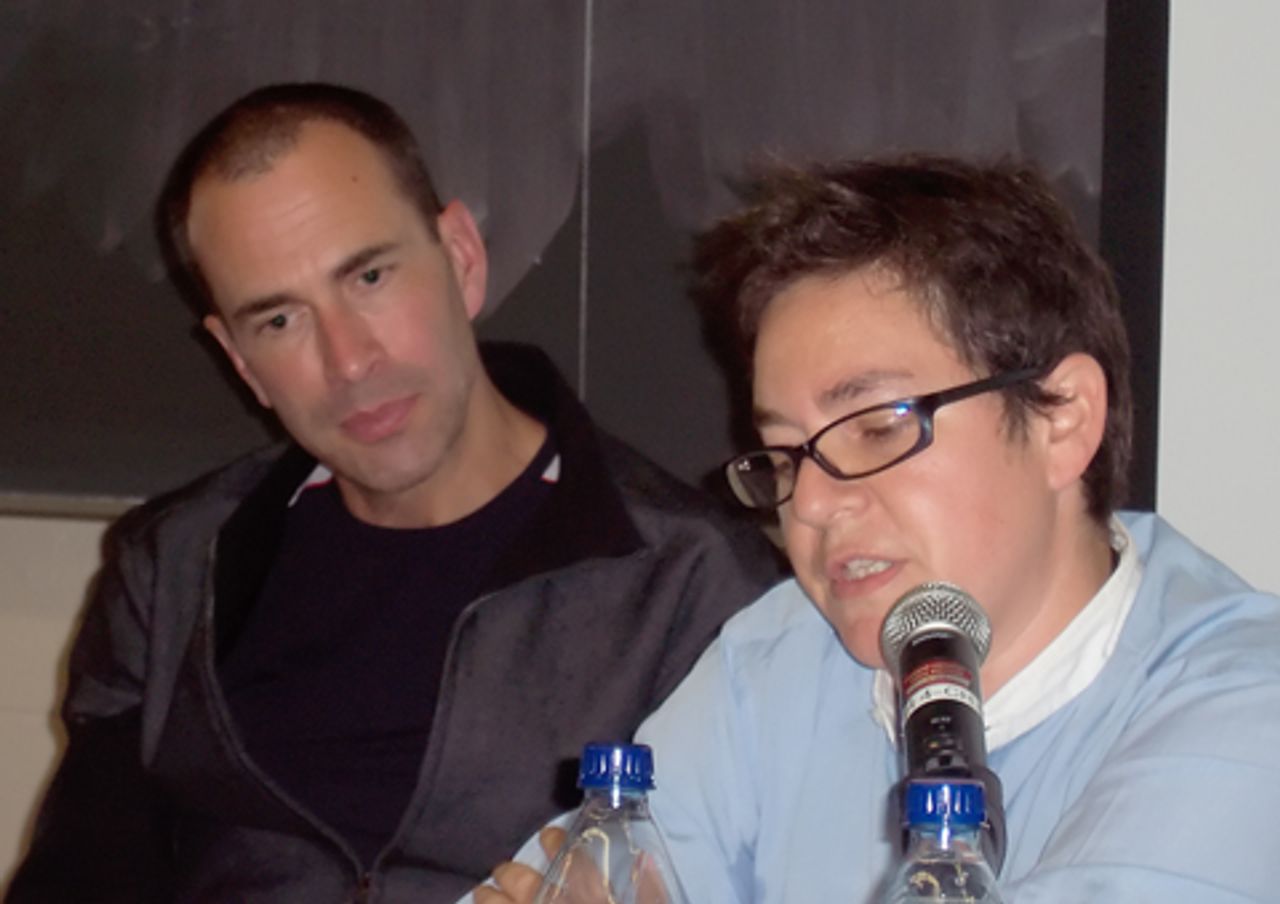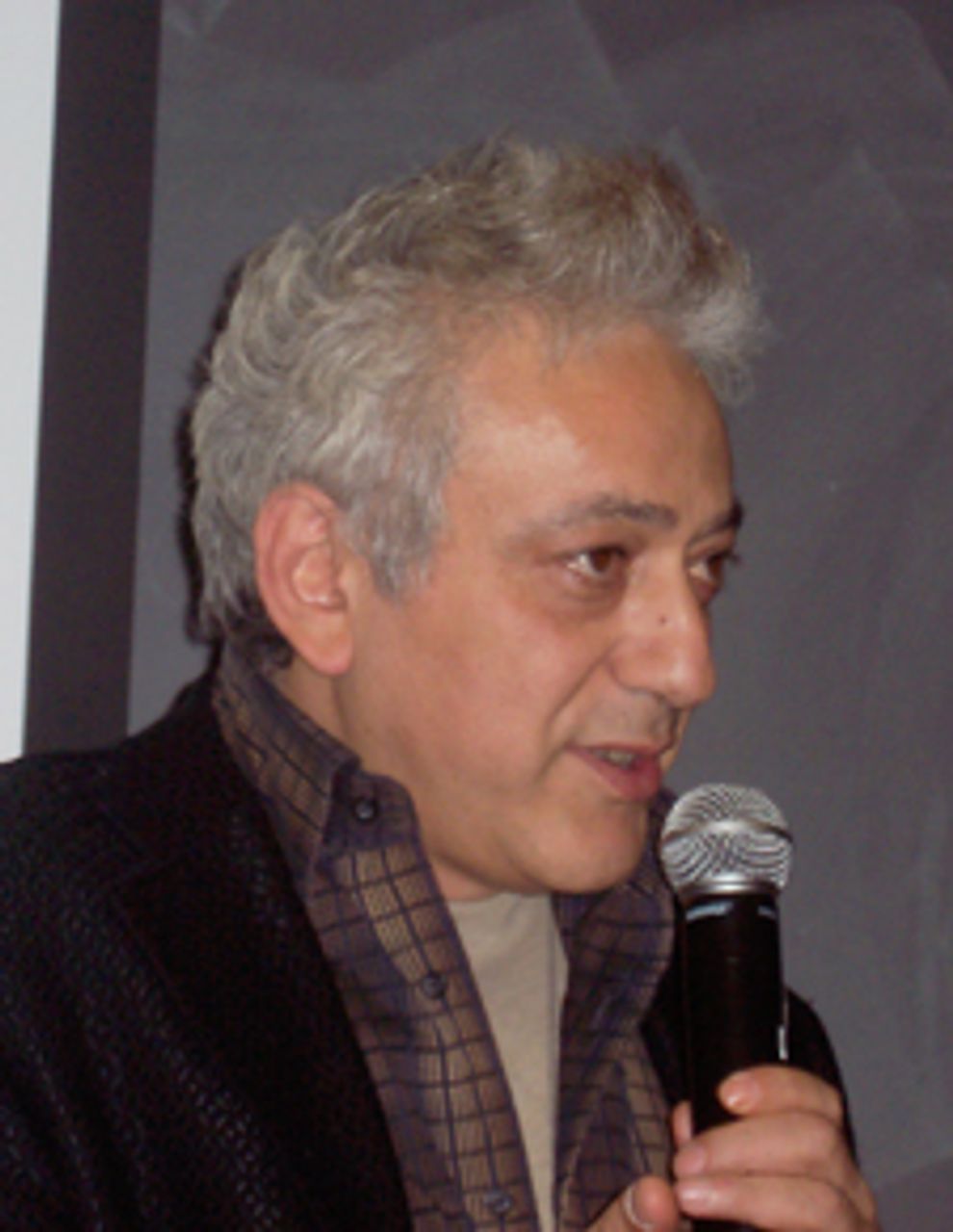Organizers of a protest against the Toronto film festival’s spotlight on Tel Aviv held a press conference Monday afternoon at Ryerson University to explain their purposes and respond to attacks by pro-Israeli forces. A number of Canadian, Palestinian and Israeli film directors and commentators spoke at the event. Udi Aloni, an Israeli filmmaker, made a statement of support in a video.
The protest is directed against the Toronto festival’s choice of Tel Aviv as the initial subject of its “City to City” series, a choice that has been seized upon by the Israeli propaganda machine as part of its effort to “re-brand” the Zionist state and whitewash its crimes.
An August 28, 2008, article in the Canadian Jewish News, the protesters’ open letter (“No Celebration of Occupation”) explains, “quotes Israeli consul general Amir Gissin as saying that Toronto would be the test city for a promotion that could then be deployed around the world. According to Gissin, the culmination of the campaign would be a major Israeli presence at the 2009 Toronto International Film Festival.”
The open letter reads, in part: “We do not protest the individual Israeli filmmakers included in City to City, nor do we in any way suggest that Israeli films should be unwelcome at TIFF [Toronto International Film Festival]. However, especially in the wake of this year’s brutal assault on Gaza, we object to the use of such an important international festival in staging a propaganda campaign.”
The protest statement has been signed by 1,500 figures in the film world, as well as by writers and academics. Among the more recent signatories are actors Julie Christie and Viggo Mortensen, blacklist victim and screenwriter Walter Bernstein, performer Harry Belafonte, and linguist Noam Chomsky.
Protest organizers have come under venomous assault from pro-Israeli elements in Canada and elsewhere. One of the more scurrilous attacks was launched by Canadian film producer and fervent pro-Zionist Robert Lantos, who accused the protesters of being “professional liars,” regurgitating “terrorist slogans,” acting “effectively [as] Mahmoud Ahmadinejad’s local fifth column,” and having “taken a page straight out of the fascist propaganda handbook.”
The vehemence of the response speaks to the increasingly indefensible actions of the Israeli regime and the determination of its supporters, especially in North America, to suppress any criticism of its policies.
Moderator Richard Fung read out a portion of a statement from Viggo Mortensen, noting that the protest against the film festival’s action “does not promote the boycotting or censorship of any artist or movie from Israel or anywhere else. Those who have attacked the statement with that accusation are simply spreading misinformation and, unfortunately, continuing the ongoing successful distraction from the issue at hand: the Israeli government’s whitewashing of their illegal and inhumane actions inside and outside their legal national borders.”
In her statement, Elle Flanders, one of the initiators of the open letter, argued that Israel’s defenders had distorted the protest letter, in an effort to distract from its content, opposition to the film festival’s collusion, direct or indirect, with the Zionist regime’s rebranding.
“Why did TIFF choose to celebrate Tel Aviv eight months after the bombing of Gaza, eight months after worldwide protests and human rights reports of war crimes?”
 John Greyson and Elle Flanders
John Greyson and Elle FlandersShe noted that the protesters were “weathering the tired old attacks of ‘anti-Semitism.’” Over 60 Israeli intellectuals and artists had signed the protest, including 11 filmmakers. Flanders observed that the opposition to the open letter had been “much more fierce and shrill than in the past.” Opponents had smeared the protesters, calling them “Jew-haters,” “anti-Semites, and more. … We are not going to be intimidated.”
Palestinian Mazen Masri, a member of the Israeli Bar Association, who has worked in the legal field in both Israel and the Occupied Territories, enumerated the various Palestinian communities that had been destroyed to make way for the emergence of Tel Aviv as a major city, along with the annexation of Jaffa.
Filmmaker John Greyson, who withdrew his film Covered from this year’s festival in late August to protest against the spotlighting of Tel Aviv, responded to Lantos’s charges. In regard to the accusation of “opportunism,” Greyson pointed out that pulling a film from the Toronto festival was “a lousy career move” and that he would probably have a difficult time “raising funds for my next project.” Opponents of the protest had written to his university, York University, demanding that he be investigated, fired, “deported.”
Greyson commented that he and others had been disturbed when the Toronto festival had collaborated with the Canadian military in staging last year’s opening night presentation of the pro-war Passchendaele. “I have to ask, who is politicizing TIFF?”
The filmmaker pointed to the slaughter in Gaza as a turning point, a moment when it became “imperative” to speak out against the “outrageous” crimes of the Israeli occupation.
A WSWS reporter noted that the decision to single out Tel Aviv for celebration seemed especially provocative in light of the massacre in Gaza, an event that horrified public opinion. “To which different proportions of insularity, political indifference and more mercenary motives do you attribute the film festival’s decision?”
Greyson responded that the protesters had requested meetings with TIFF officials in July, although “we didn’t get a reply until late August.” They had gone into a meeting with festival officials “in good faith … we came out of the meeting much more upset. Again, I think these are questions for TIFF. We see connections, we see coincidence in terms of ‘Brand Israel.’ Why hasn’t that either been clarified or repudiated in ways that are public or satisfactory? There have been vague disavowals [of the link between the festival spotlight on Tel Aviv and the Israeli propaganda effort] around a whole number of these questions, and little else.”
 Elia Suleiman
Elia SuleimanIn response to the question, “What is the best way to support Palestinian filmmakers?,” one of those, Elia Suleiman (Chronicle of Love and Pain) commented that he had doubts about making the case of the Palestinians “exclusive and special.” He suggested that Palestinian filmmakers had shown considerable ingenuity in their film work and that “support” suggested a kind of “conceptual charity.”
Suleiman remarked that his films, “relatively speaking, travel very well,” and that the real problem was the dominance of “commerciality” in the film world. “I would love my films to be shown in 1,000 theaters, but that is not a question of being Palestinian. … All filmmakers who come with a more complex, artistic filmmaking are themselves Palestinian in some way or another.”
He went on to denounce the Arab regimes, “juntas,” who are “co-producers” of the loss of Palestine. They also “brainwash” their own thinkers and critics, those “they can buy,” who simply write slogans in their newspapers. Coming back to the question, he suggested that support for Palestinian filmmakers meant seeing their films and listening to their stories.
Yousry Nasrallah, an Egyptian filmmaker, observed that ten years ago he had a film at the Toronto film festival in a program called “Planet Africa,” which upset him, “because I always thought that Africa was part of the world, Planet Earth, and since then, I never set foot again in Toronto.”
